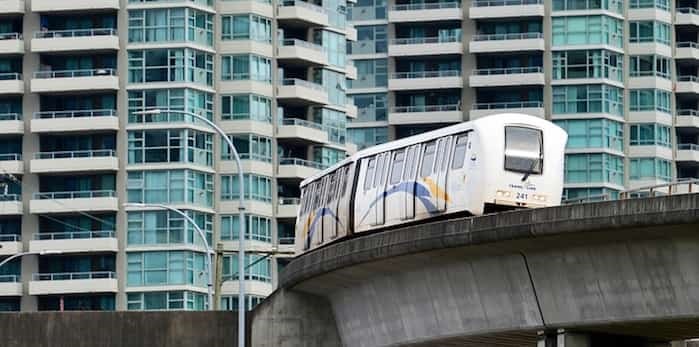Public transit is going to be scaled back radically in Metro Â鶹´«Ă˝Ół»due to COVID-19, and a number of people out of work for the time being, as TransLink announced Monday a series of cost-cutting measures that includes layoffs and schedule changes.
Ridership is down 83% across the transit service, and TransLink says they are losing an estimated $75 million per month as the COVID-19 crisis continues.
"This rate of financial loss is not sustainable," says TransLink in a media release.
TransLink outlines the measures as follows:
- Implement further suspension of transit services on Bus, SkyTrain, SeaBus, and West Coast Express, beginning this week.
- Issue temporary layoff notices to 1,492 employees. These employees work in various positions at TransLink, Coast Mountain Bus Company, and British Columbia Rapid Transit Company.
- Reduce senior executive salaries and Board remuneration by 10%.
- Reduce organizational costs and program expenditures, including:
- Deferral of the 2020 Major Road Network operations, maintenance and rehabilitation program funding to municipalities.
- Deferral of 2020 service expansions.
- Spend cash reserves to sustain current essential service operations through to the end of 2020.
“This has been an incredibly tough decision and one we do not take lightly,” says TransLink CEO Kevin Desmond. “We’ve done our best to try and reduce costs through other means, but TransLink is losing $75 million per month, and we’re left with no other options. It’s not lost on me what an impact this decision will have on the lives of our employees and their families. I fully expect those affected will be recalled once TransLink returns to regular operations, which we are now planning for back-to-school in September, if consistent with provincial guidelines.”
TransLink has been vocal about the need for a cash infusion from the government in order to allow the transit provider to be able to resume near-regular service in the future.
"TransLink and the Province of BC have been working closely to ensure that funding is available to allow TransLink to reverse layoffs and return to near-regular operations in time for back-to-school in September. TransLink and the Province are also working on a plan to address the longer-term fiscal sustainability of TransLink in order to ensure the transportation authority can continue delivering transit services and key projects in 2021 and beyond."
In addition to the reduced ridership carving out a significant chunk of their revenue, low gas prices and consumption in the region means TransLink is collecting less fuel tax revenue. In March, TransLink also implemented fare removal on the bus system in order to facilitate rear-boarding to promote physical distancing and to protect bus drivers and passengers.
A planned fare increase for July 1, 2020 has also been deferred.
Currently, TransLink is focused on offering safe transportation for those who cannot use an alternate method of travel within the region, and in particular frontline workers in a number of fields. They continue to ask that use be restricted to essential trips only, and that passengers participate in physical distancing.
Service reductions will affect all modes of transit on TransLink: SkyTrain, bus, SeaBus, and West Coast Express, and will be implemented this week.
Here are specifics by mode for all TransLink service reductions:
SkyTrain
- Beginning Wednesday (April 22), Expo and Millennium Line capacity will be further reduced.
- Expo Line capacity will be reduced by 20% during peak hours. During middays, early evenings, and weekends, capacity will be reduced by 20% to 40%, depending on the time of day.
- These capacity reductions are in addition to a 17% reduction during peak hours and a 20% reduction on Friday and Saturday evenings, which were implemented last month.
- Millennium Line capacity will be reduced by 15% during peak hours. During middays, early evenings, and weekends, capacity will be reduced by 20% to 40%, depending on the time of day.
- These capacity reductions are in addition to a 17% reduction during peak hours and a 20% reduction on Friday and Saturday evenings, which were implemented last month.
- Canada Line capacity has been reduced by 18% during peak hours.
Bus
- Beginning Friday (April 24), 18 bus routes will be suspended.
- Suspended routes: 15, 32, 50, 68, 105, 131, 132, 143, 222, 480, 414, R3. Most of these routes have other transit as alternatives
- Suspended NightBus routes: N8, N15, N17, N22, N24, N35.
- Beginning in early May, we expect another 47 routes will be suspended, and frequency reduced on many remaining routes.
- Expected route suspensions: 251, 252, 262, 280, 281, 282, 370, 563, 564, 044, 170, 181, 182, 231, 241, 247, 258, 345, 352, 354, 391, 393, 394, 395, 416, 509, 602, 603, 604, 606, 608, 614, 616, 617, 618, 619, 719, 722, 733, 741, 744, 748, 749, 791, 042, 150, 179. Precise timing for these suspensions and reductions will be released in due course.
- TransLink is prioritizing service to routes serving hospitals and other health facilities. Routes selected for suspension either duplicate other routes or are in low ridership areas. The number of people TransLink can move on buses was reduced to around 30% of normal levels due to physical distancing measures. Once all planned service reductions are implemented, the number of people TransLink can move will decrease further, to around 20% of normal levels.
SeaBus
- Beginning Wednesday (April 22), SeaBus will end service earlier. The last SeaBus sailing of the day will happen at 7:30 p.m. from Lonsdale Quay and 7:45 p.m. from Waterfront. SeaBus will continue sailings every 30-minutes.
West Coast Express
- Beginning Wednesday (April 22), West Coast Express trains One, Three, and Five will continue to operate on existing schedules but will have fewer cars. Trains Two and Four remain suspended.



